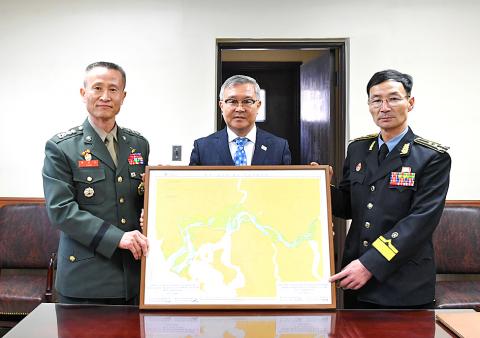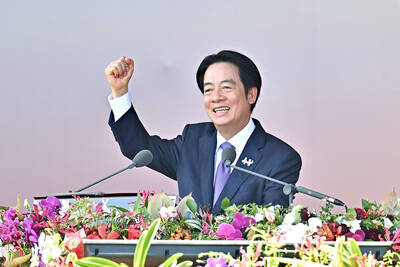North Korea has promised to destroy all of its facilities for making fuel for nuclear bombs, a top US negotiator said, in a sign that US President Donald Trump is seeking clearer disarmament steps from his upcoming summit with North Korean leader Kim Jong-un.
North Korea has committed “to the dismantlement and destruction” of all its uranium and plutonium-enrichment facilities in talks with US Secretary of State Michael Pompeo and South Korean leaders, US Special Representative for North Korea Stephen Biegun said in a speech on Thursday.
The pledge goes beyond the Yongbyon Nuclear Scientific Research Center, which Kim has previously offered to demolish, Biegun said at Stanford University in California.

Photo: EPA-EFE
“This complex of sites extending beyond Yongbyon represents the totality of the North Korean plutonium-reprocessing and uranium-enrichment programs,” Biegun said.
He added that North Korea wanted the US to take “corresponding measures” — which he would discuss with North Korean officials in upcoming talks.
Biegun’s comments — his first public speech in five months as Pompeo’s special envoy — offered a rare insight into the US administration’s approach to North Korea that officials had previously declined to provide.
Kim has made no commitments to let North Korea’s arsenal be inspected or dismantled since agreeing to “work toward complete denuclearization of the Korean Peninsula” in his first meeting with Trump in June last year.
Earlier in the day, Trump said that he would next week announce the time and place of the summit, which is expected to take place late this month in Vietnam.
While Trump continues to say that North Korea’s lack of missile and nuclear tests for more than a year were key achievements, leaked intelligence reports and analyses of satellite imagery suggests that Kim has used the time to stockpile more nuclear material and missiles.
However, Trump’s top intelligence officials have expressed doubt that the US will ever achieve its goal of “total denuclearization.”
US Director of National Intelligence Dan Coats on Tuesday told a US Senate committee that the intelligence community “continues to assess that it [North Korea] is unlikely to give up all of its WMD [weapons of mass destruction] stockpiles, delivery systems and production capabilities.”
“North Korean leaders view nuclear arms as critical to regime survival,” Coats said.

The Ministry of the Interior (MOI) is to tighten rules for candidates running for public office, requiring them to declare that they do not hold a Chinese household registration or passport, and that they possess no other foreign citizenship. The requirement was set out in a draft amendment to the Enforcement Rules of the Public Officials Election and Recall Act (公職人員選舉罷免法 ) released by the ministry on Thursday. Under the proposal, candidates would need to make the declaration when submitting their registration forms, which would be published in the official election bulletin. The move follows the removal of several elected officials who were

FOUR DESIGNATED AREAS: Notices were issued for live-fire exercises in waters south and northwest of Penghu, northeast of Keelung and west of Kaohsiung, they said The military is planning three major annual exercises across the army, navy and air force this month, with the navy’s “Hai Chiang” (海強, “Sea Strong”) drills running from today through Thursday, the Ministry of National Defense said yesterday. The Hai Chiang exercise, which is to take place in waters surrounding Taiwan, would feature P-3C Orion maritime patrol aircraft and S-70C anti-submarine helicopters, the ministry said, adding that the drills aim to bolster the nation’s offshore defensive capabilities. China has intensified military and psychological pressure against Taiwan, repeatedly sending warplanes and vessels into areas near the nation’s air defense identification zone and across

SENATE RECOMMENDATION: The National Defense Authorization Act encourages the US secretary of defense to invite Taiwan’s navy to participate in the exercises in Hawaii The US Senate on Thursday last week passed the National Defense Authorization Act (NDAA) for Fiscal Year 2026, which strongly encourages the US secretary of defense to invite Taiwan’s naval forces to participate in the Rim of the Pacific (RIMPAC) exercise, as well as allocating military aid of US$1 billion for Taiwan. The bill, which authorizes appropriations for the military activities of the US Department of Defense, military construction and other purposes, passed with 77 votes in support and 20 against. While the NDAA authorizes about US$925 billion of defense spending, the Central News Agency yesterday reported that an aide of US

NATIONAL DAY: The ‘Taiwan Dome’ would form the centerpiece of new efforts to bolster air defense and be modeled after Israel’s ‘Iron Dome,’ sources said President William Lai (賴清德) yesterday pledged to strengthen the nation’s air defense capabilities and build a “T-Dome” system to create a safety net against growing military threats from China. “We will accelerate our building of the T-Dome, establish a rigorous air defense system in Taiwan with multi-layered defense, high-level detection and effective interception, and weave a safety net for Taiwan to protect the lives and property of citizens,” he said in his National Day address. In his keynote address marking the Republic of China’s (ROC) 114th anniversary, Lai said the lessons of World War II have taught nations worldwide “to ensure that